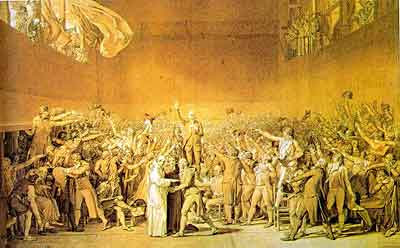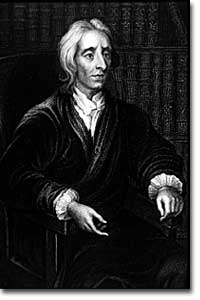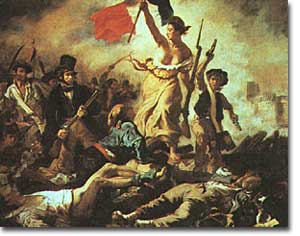

These words represent basic values of democratic political systems, including that of the United States. Rule by absolute monarchs and emperors has often brought peace and order, but at the cost of personal freedoms. Democratic values support the belief that an orderly society can exist in which freedom is preserved. But order and freedom must be balanced.

In the early days of the French revolution, the members of the third estate agreed to stick together in the face of opposition from the king and nobles. The "Tennis Court Oath" became the first step towards representative democracy in France.
The American government has its roots in the seventeenth and eighteenth century Enlightenment in Europe, a movement that questioned the traditional authority of the monarch to rule. What gives one person the right to rule another? Enlightenment philosophes answered the question by acknowledging the importance of establishing order. They were influenced by the chaos of medieval times, when a lack of centralized government brought widespread death and destruction. Havens from invaders and attackers were necessary for survival, so weaker people allied themselves with stronger ones, and kings came to rule who provided protection in return for work and allegiance from their subjects.

John Locke was the English philosopher who theorized that government was the manifestation of a general will of "the governed" that allowed the governed to change their governors at will. His book, Treatises on Civil Government, was very influential in the American revolution.
As order was established and new economic patterns emerged, people began to question the king's right to rule. For example, John Locke , an eighteenth century English philosopher, theorized that the right to rule came from the " consent of the governed ." Montesquieu wrote with admiration about three "branches" of government that checked one another's power. Rousseau believed that communities were most justly governed by the " general will " or majority rule of their citizens. Though the philosophes believed that rulers were important for maintaining order, they questioned the sacrifice of individual freedom that they saw under European monarchs.

Imagine a society in which everyone was perfectly free to do as he or she pleased. How long would it take for chaos to set in? Order implies a necessary loss of freedom if people are to survive. However, how far can order go? Democratic countries cherish individual freedom and generally believe that laws should not be repressive ; a little order can be sacrificed in the name of liberty . So one kind of balance is between order and liberty.
Democratic societies also expect another kind of balance: a compromise between liberty and equality. Complete liberty logically leads to inequality. A strong or ambitious person might acquire more goods and property than another, and someone is bound to dominate. But the line has to be drawn before an individual seizes power that greatly restricts the liberties of others.

The ideals of the first French revolution also inspired the 1830 revolution in Paris. The ideas of "Liberty, Equality, and Fraternity" were immortalized in the three colors of the French flag. In Delacroix's painting, Liberty is seen leading the people toward these ideals.
Shouldn't governments help preserve some degree of equality for their citizens? But if they overemphasize equality, won't they restrict their citizens' liberty? For example, governments can bring about more equality by taxing rich citizens more than the poor, but if they carry their policies too far, won't they restrict the individual's freedom to strive for economic success? The balance between liberty and equality is an important cornerstone of democratic government.
In the late 18th century the Founders created the blueprints for the United States government in an effort to achieve these delicate balances — between liberty and order, and between liberty and equality. Their success is reflected in the continuing efforts to refine them. The formula has changed with time, but the framework provided by the Constitution and the values expressed by the Declaration of Independence remain the same.
The European Enlightenment
The European Enlightenment spawned democratic ideas that are valued today. This Washington State University site takes a good look at those ideas and the men and times that shaped democracy as we know it. Straight-up text, but accessible.
John Locke
The U.S. Constitution was based on many ideas that John Locke originated, such as the "social contract" made between man and state. This Oregon State University page summarizes Locke's major ideas, and has pictures of Locke, a timeline, and links to other sites about Locke as well.
Montesquieu: Spirit of the Laws
Charles de Secondat, Baron de Montesquieu was a researcher into French history and law, and in his book The Spirit of the Laws he presented his ideas on government. It is from Montesquieu that the founders of the United States received the idea of the separation of powers into branches of government. Read excerpts from Spirit of the Laws published by the Internet Modern History Sourcebook.
Jean-Jacques Rousseau
Jean-Jacques Rousseau came to believe that states were justly governed only if they were governed by the general will. He originated the idea of the "social contract," a bond of agreement between citizens and their government, that was very important in the development of democracy. This brief biography includes links to more extensive bios of the great thinker.
Voltaire
Voltaire was another of the French philosophes who fomented the ideas that lay behind the American and French revolutions. This page by an independent Voltaire scholar has a biography of Voltaire, several articles on the thinker, and also electronic versions of two of his major works: the Philosophical Dictionary and Candide.
The Declaration of the Rights of Man
The most important French revolutionary document about the values of democracy is The Declaration of the Rights of Man. It established the rights of citizens that could not be infringed upon by government, thus insuring liberty. Yale University provides this online version of the Declaration.
Tocqueville
Alexis de Tocqueville was a French observer of American democracy. He found in his journeys across the new country that many of the ideas held dear by the democratic philosophers of France were working in America. Tocqueville published his observations in the book Democracy in America. C-SPAN, to celebrate Tocqueville's work and to celebrate democracy, presents this illustrated website that includes excerpts from Tocqueville's writings and interactive exhibits about his travels in America.
John Stuart Mill — On Liberty
John Stuart Mill was perhaps the leading democratic thinker of Victorian Britain. His works on human liberty had a tremendous impact on 19th century Britain and the modern Western world.